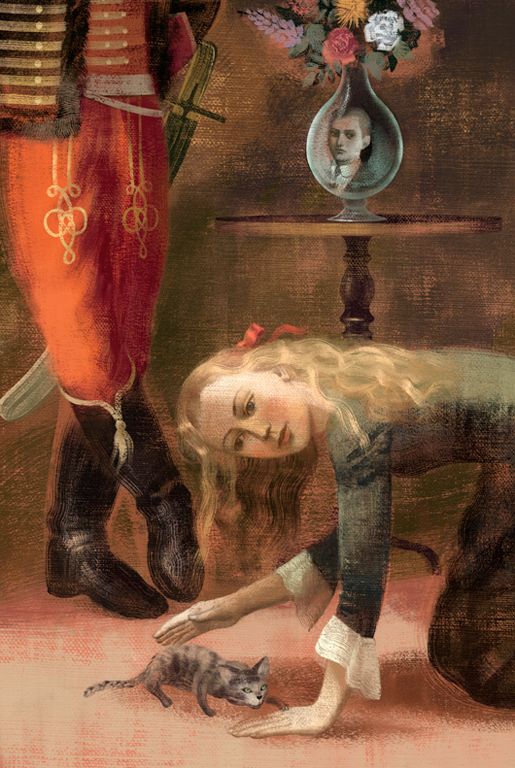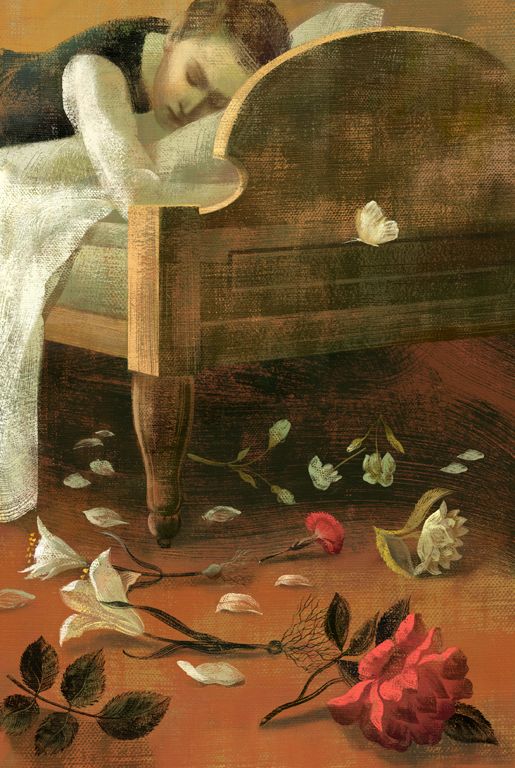Take a photo of a barcode or cover
challenging
emotional
reflective
medium-paced
Plot or Character Driven:
Character
Strong character development:
Yes
Loveable characters:
Yes
Diverse cast of characters:
No
Flaws of characters a main focus:
Yes
dark
emotional
reflective
sad
tense
Strong character development:
Yes
Diverse cast of characters:
No
emotional
reflective
slow-paced
Plot or Character Driven:
Character
Strong character development:
Yes
Loveable characters:
Complicated
Diverse cast of characters:
No
Flaws of characters a main focus:
No
my introduction to russian literature. i hope with all my heart that -- i am planning to go on reading russian lit -- there are to be more voices akin to that of vladimir petrovich... at times i could not stop my genuine audible laughter at how sweet he was in all his youth and vigor.
'The young men offered their foreheads so eagerly, and there was in the girl's movements (I saw her in profile) something so enchanting, imperious and caressing, so mocking and charming, that I nearly cried out with wonder and delight, and should, I suppose, at that moment, have given everything in the world to have those lovely fingers tap my forehead too.'
yes, i am much the same as you vladimir. the final events of the book -- and this may be in large part due to my general stupidity -- seemed to confuse me for a short while. i had to reread those final few chapters three times, i believe, to piece together concretely exactly what it was that had happened. when i had arrived there, i was very pleased, but the hiccup affected my enjoyment of the book, so...
also -- this was a novella, so i read it to completion within 24 hours! a very quick, but very nice read.
'The young men offered their foreheads so eagerly, and there was in the girl's movements (I saw her in profile) something so enchanting, imperious and caressing, so mocking and charming, that I nearly cried out with wonder and delight, and should, I suppose, at that moment, have given everything in the world to have those lovely fingers tap my forehead too.'
yes, i am much the same as you vladimir. the final events of the book -- and this may be in large part due to my general stupidity -- seemed to confuse me for a short while. i had to reread those final few chapters three times, i believe, to piece together concretely exactly what it was that had happened. when i had arrived there, i was very pleased, but the hiccup affected my enjoyment of the book, so...
also -- this was a novella, so i read it to completion within 24 hours! a very quick, but very nice read.
O sweet feelings, soft sounds, goodness and peace of a moved spirit, the melting joy of the first tender emotions of love - - where are you, where are you?
Nostalgia.
Reading First love made me wonder on the nature of nostalgia. Is the nostalgic feeling negative or positive? Is First love, the 1860 novella of which Turgenev by the end of his life thought of fondly as ‘the only thing that still gives me pleasure, because it is life itself, it was not made up….First Love is part of my experience’ - a tale of nostalgia? If nostalgia means ‘the pain from an old wound’, a feeling in which bitter-sweetness is preponderant, the novella certainly is a nostalgic one. If nostalgia is rather ‘a wistful desire to return in thought or in fact to a former time in one’s life, to one’s home or homeland, or to one’s family and friends; a sentimental yearning for the happiness of a former place or time’ – I would think of this story as of a profound melancholy, rather than a nostalgic one. Even taking into account a slight tinge of sadness is an intrinsic part of nostalgia, the tale of the narrator can hardly be seen as the wish to turn back time reminiscing on feelings of pleasure in the past.
Unlike my experiences with other Russian 19th century writers in my teens, my first acquaintance with Ivan Turgenev’s writing wasn’t exactly a coup de foudre. Reading [b:Fathers and Sons|19117|Fathers and Sons|Ivan Turgenev|https://i.gr-assets.com/images/S/compressed.photo.goodreads.com/books/1390793535l/19117._SY75_.jpg|1294426] at sixteen, having high expectations of that classic novel (curious I was about the ‘nihilism’) Turgenev’s tale didn’t enthral me like Anton Chekhov’s stories ([b:The Lady With the Little Dog and Other Stories, 1896-1904|114599|The Lady With the Little Dog and Other Stories, 1896-1904|Anton Chekhov|https://i.gr-assets.com/images/S/compressed.photo.goodreads.com/books/1311645445l/114599._SY75_.jpg|1037311]), Tolstoy’s War and Peace, or Dostoyevsky’s The Idiot and Crime and Punishment did. Subsequently, I disregarded him for about the next thirty years. Nonetheless, by various ways Turgenev reminded me of his existence more than any other Russian writer did: I encountered him when reading Flaubert’s letters, when reading on Eugène Delacroix, on Franz Liszt, Frédéric Chopin and George Sand – or on Dostoyevsky’s peregrinations (on their feud and quarrel/near fight in Baden-Baden). A few years ago I read his [b:Home of the Gentry|28463|Home of the Gentry|Ivan Turgenev|https://i.gr-assets.com/images/S/compressed.photo.goodreads.com/books/1473567535l/28463._SY75_.jpg|2214642], which mesmerised me and for the first time it dawned on me that reading Turgenev for me might equate the relish of drinking wine, which I also only later in life got to appreciate. A friend writes about Turgenev’s style that it is softer, more subtle than the style of some of his fellow 19th century Russian writers and he, I feel, is spot on – Turgenev’s prose is of a sensitivity, beauty and subtlety which I think was wasted on my hapless teen self.

Sometimes a title seduces, sometimes it keeps me from reading a book. Such was the case with First love which I could have read far earlier, when I got a marvellous bibliophile edition of First love as a Christmas present from the typographer of the law publishing house I was working for more than twenty years ago. I presume I passed it to my father, as no longer finding it in the bookcase at home. It had a beautiful, purple cover and delicate paper, the kind of book one glances through with awe. I assumed the subject of First Love – which to my ears sounded like puppy love – wouldn’t particularly speak to me, nor when I would have read it at the age of the protagonist when the events unfold, nor later when I considered that phase in life too remote to be of interest anymore. And maybe I am still that sentimental I simply dislike the fact that the word ‘first’ ineludibly implies the sense of an ending? Maybe my nostalgia for that first love isn’t strong enough (we were both five years old, and according to our parents, very much in love with each other)? But I was wrong. First love is far richer than a mawkish tale on unrequited adolescent love (why is all in Dolors’s fabulous review). To me it is the narrative frame, the middle-aged Vladimir Petrovich recounting his recollection of his emotional experiences as a sixteen year old, infatuated with an impoverished, aristocratic young woman, larding his account with his comments and musings on time, love, youth and aging which makes this story (of which the denouement is a little predictable) so effective, intense and affecting. The plot and the denouement might be a little predictable, I loved the melancholic glow the tale wallows in.

In [b:The Road to Middlemarch: My Life with George Eliot|20924311|The Road to Middlemarch My Life with George Eliot|Rebecca Mead|https://i.gr-assets.com/images/S/compressed.photo.goodreads.com/books/1393428826l/20924311._SY75_.jpg|25047012] , the author, Rebecca Mead, writes about Eliot as ‘the great artist of disappointment. Her characters, even the good ones, stumble, fall, and fail—not into inexorable tragedy, for the most part, but into limited, mortal resignation’. Concurrently, when reading First Love is it rather obvious why Turgenev has been called ‘a poet of disappointment’. The human condition worded in an achingly beautiful prose.
Take this magnificent phrase:
The air blew in a gust for an instant; a streak of fire flashed across the sky; it was a star falling. ‘Zinaïda?’ I wanted to call, but the word died away on my lips. And all at once everything became profoundly still around, as is often the case in the middle of the night. . . . Even the grasshoppers ceased their churr in the trees — only a window rattled somewhere. I stood and stood, and then went back to my room, to my chilled bed. I felt a strange sensation; as though I had gone to a tryst, and had been left lonely, and had passed close by another’s happiness.
And it is this, this masterly evocation of happiness that seemed so near, which is just out of reach but cannot be grasped, which affected me most both in First Love as well as in Home of the Gentry. Yes, this is life.
If only for this sentence, First love was worth reading to me. It was another reminder how books, in just one sentence, paragraph or stanza can capture the essence of life – its sadness, its futility, the moment when we realise happiness might be for others, but not for us – the dawning and wilting of promise, the wisdom of resignation. Older, sadder, wiser, I think I am finally able to appreciate the kind of treasures Turgenev has to offer, and I could concur with Vladimir Petrovich looking back (on love): ‘I wouldn’t want it ever to be repeated, but I would have considered myself unfortunate if I’d never experienced it.’
As Turgenev wrote to Countess Lambert in 1861: ‘All my life belongs to the past. All that is dear in the present is a reflection of the past. And what, after all, was the best about the past? Hope…the possibility of hoping…in other words, the future…’.
Nostalgia.
(Illustrations Anna and Elena Balbusso)
Nostalgia.
Reading First love made me wonder on the nature of nostalgia. Is the nostalgic feeling negative or positive? Is First love, the 1860 novella of which Turgenev by the end of his life thought of fondly as ‘the only thing that still gives me pleasure, because it is life itself, it was not made up….First Love is part of my experience’ - a tale of nostalgia? If nostalgia means ‘the pain from an old wound’, a feeling in which bitter-sweetness is preponderant, the novella certainly is a nostalgic one. If nostalgia is rather ‘a wistful desire to return in thought or in fact to a former time in one’s life, to one’s home or homeland, or to one’s family and friends; a sentimental yearning for the happiness of a former place or time’ – I would think of this story as of a profound melancholy, rather than a nostalgic one. Even taking into account a slight tinge of sadness is an intrinsic part of nostalgia, the tale of the narrator can hardly be seen as the wish to turn back time reminiscing on feelings of pleasure in the past.
Unlike my experiences with other Russian 19th century writers in my teens, my first acquaintance with Ivan Turgenev’s writing wasn’t exactly a coup de foudre. Reading [b:Fathers and Sons|19117|Fathers and Sons|Ivan Turgenev|https://i.gr-assets.com/images/S/compressed.photo.goodreads.com/books/1390793535l/19117._SY75_.jpg|1294426] at sixteen, having high expectations of that classic novel (curious I was about the ‘nihilism’) Turgenev’s tale didn’t enthral me like Anton Chekhov’s stories ([b:The Lady With the Little Dog and Other Stories, 1896-1904|114599|The Lady With the Little Dog and Other Stories, 1896-1904|Anton Chekhov|https://i.gr-assets.com/images/S/compressed.photo.goodreads.com/books/1311645445l/114599._SY75_.jpg|1037311]), Tolstoy’s War and Peace, or Dostoyevsky’s The Idiot and Crime and Punishment did. Subsequently, I disregarded him for about the next thirty years. Nonetheless, by various ways Turgenev reminded me of his existence more than any other Russian writer did: I encountered him when reading Flaubert’s letters, when reading on Eugène Delacroix, on Franz Liszt, Frédéric Chopin and George Sand – or on Dostoyevsky’s peregrinations (on their feud and quarrel/near fight in Baden-Baden). A few years ago I read his [b:Home of the Gentry|28463|Home of the Gentry|Ivan Turgenev|https://i.gr-assets.com/images/S/compressed.photo.goodreads.com/books/1473567535l/28463._SY75_.jpg|2214642], which mesmerised me and for the first time it dawned on me that reading Turgenev for me might equate the relish of drinking wine, which I also only later in life got to appreciate. A friend writes about Turgenev’s style that it is softer, more subtle than the style of some of his fellow 19th century Russian writers and he, I feel, is spot on – Turgenev’s prose is of a sensitivity, beauty and subtlety which I think was wasted on my hapless teen self.

Sometimes a title seduces, sometimes it keeps me from reading a book. Such was the case with First love which I could have read far earlier, when I got a marvellous bibliophile edition of First love as a Christmas present from the typographer of the law publishing house I was working for more than twenty years ago. I presume I passed it to my father, as no longer finding it in the bookcase at home. It had a beautiful, purple cover and delicate paper, the kind of book one glances through with awe. I assumed the subject of First Love – which to my ears sounded like puppy love – wouldn’t particularly speak to me, nor when I would have read it at the age of the protagonist when the events unfold, nor later when I considered that phase in life too remote to be of interest anymore. And maybe I am still that sentimental I simply dislike the fact that the word ‘first’ ineludibly implies the sense of an ending? Maybe my nostalgia for that first love isn’t strong enough (we were both five years old, and according to our parents, very much in love with each other)? But I was wrong. First love is far richer than a mawkish tale on unrequited adolescent love (why is all in Dolors’s fabulous review). To me it is the narrative frame, the middle-aged Vladimir Petrovich recounting his recollection of his emotional experiences as a sixteen year old, infatuated with an impoverished, aristocratic young woman, larding his account with his comments and musings on time, love, youth and aging which makes this story (of which the denouement is a little predictable) so effective, intense and affecting. The plot and the denouement might be a little predictable, I loved the melancholic glow the tale wallows in.

In [b:The Road to Middlemarch: My Life with George Eliot|20924311|The Road to Middlemarch My Life with George Eliot|Rebecca Mead|https://i.gr-assets.com/images/S/compressed.photo.goodreads.com/books/1393428826l/20924311._SY75_.jpg|25047012] , the author, Rebecca Mead, writes about Eliot as ‘the great artist of disappointment. Her characters, even the good ones, stumble, fall, and fail—not into inexorable tragedy, for the most part, but into limited, mortal resignation’. Concurrently, when reading First Love is it rather obvious why Turgenev has been called ‘a poet of disappointment’. The human condition worded in an achingly beautiful prose.
Take this magnificent phrase:
The air blew in a gust for an instant; a streak of fire flashed across the sky; it was a star falling. ‘Zinaïda?’ I wanted to call, but the word died away on my lips. And all at once everything became profoundly still around, as is often the case in the middle of the night. . . . Even the grasshoppers ceased their churr in the trees — only a window rattled somewhere. I stood and stood, and then went back to my room, to my chilled bed. I felt a strange sensation; as though I had gone to a tryst, and had been left lonely, and had passed close by another’s happiness.
And it is this, this masterly evocation of happiness that seemed so near, which is just out of reach but cannot be grasped, which affected me most both in First Love as well as in Home of the Gentry. Yes, this is life.
If only for this sentence, First love was worth reading to me. It was another reminder how books, in just one sentence, paragraph or stanza can capture the essence of life – its sadness, its futility, the moment when we realise happiness might be for others, but not for us – the dawning and wilting of promise, the wisdom of resignation. Older, sadder, wiser, I think I am finally able to appreciate the kind of treasures Turgenev has to offer, and I could concur with Vladimir Petrovich looking back (on love): ‘I wouldn’t want it ever to be repeated, but I would have considered myself unfortunate if I’d never experienced it.’
As Turgenev wrote to Countess Lambert in 1861: ‘All my life belongs to the past. All that is dear in the present is a reflection of the past. And what, after all, was the best about the past? Hope…the possibility of hoping…in other words, the future…’.
Nostalgia.
(Illustrations Anna and Elena Balbusso)
challenging
emotional
mysterious
reflective
sad
tense
medium-paced
Plot or Character Driven:
Character
Strong character development:
Yes
Loveable characters:
No
Diverse cast of characters:
No
Flaws of characters a main focus:
Yes
While I went into this book with high expectations, having heard many people praise it, I found the overall story quite underwhelming and anticlimactic.
The characters felt bland, the storyline was boring, and at times, outright strange. I felt that if the author had emphasized different aspects, it would have been much more engaging.
It's a story about first love, but that love is reduced to a young boy constantly confused by his feelings and the events around him. I believe the story could have been stronger if it focused more on Zinaida’s character—why she acted so erratically, experienced mood swings, and the reality of being groomed by a predatory older man. This would have made for a powerful commentary on such a difficult subject. Instead, even though the story revolves around first love, I struggled to believe in the emotions presented, largely because the characters lacked chemistry.
While the author skillfully portrays Vladimir's inner thoughts and his emotional growth, he fails to make us connect with the other characters or the story itself. My dominant emotion while reading was disgust, especially as the focus shifted to Vladimir's father's affair, and I don't think that's what Turgenev was going for, considering the book's title.
Ironically, the most realistic part of that story is there is a grown man in there being a creep (man are loathsome - what else is new).
Overall, Turgenev certainly had a way with words and expressed his ideas beautifully, but in my opinion, this was not his best work. It shouldn't be the one to gain popularity, as he had much more to offer.
The characters felt bland, the storyline was boring, and at times, outright strange. I felt that if the author had emphasized different aspects, it would have been much more engaging.
It's a story about first love, but that love is reduced to a young boy constantly confused by his feelings and the events around him. I believe the story could have been stronger if it focused more on Zinaida’s character—why she acted so erratically, experienced mood swings, and the reality of being groomed by a predatory older man. This would have made for a powerful commentary on such a difficult subject. Instead, even though the story revolves around first love, I struggled to believe in the emotions presented, largely because the characters lacked chemistry.
While the author skillfully portrays Vladimir's inner thoughts and his emotional growth, he fails to make us connect with the other characters or the story itself. My dominant emotion while reading was disgust, especially as the focus shifted to Vladimir's father's affair, and I don't think that's what Turgenev was going for, considering the book's title.
Ironically, the most realistic part of that story is there is a grown man in there being a creep (man are loathsome - what else is new).
Overall, Turgenev certainly had a way with words and expressed his ideas beautifully, but in my opinion, this was not his best work. It shouldn't be the one to gain popularity, as he had much more to offer.
This is the first novella I’ve read from Ivan Turgenev. I found it quite randomly whilst browsing the free books selections on my eReader app. The synopsis piqued my interest right away as I’ve a soft spot for love stories. It didn’t take long for me read and I quite enjoyed it.
First Love is a about Vladimir, a 16 year old boy falling in love for the first time with his new neighbor, a beautiful princess name Zenaida. Unfortunately for Vladimir, his love is unrequited. Thus we as readers experience Vladamir’s roller coaster of emotions; hope, excitement, jealousy, confusion, rage, anxiety, and back again as he is held captive by Zenaida’s capricious ways. I enjoyed Turgenev’s convincing writing style. He managed to pack quite a story in less than 130 pages! My heart went out to Vladimir when he figures out who Zenaida’s heart belongs to.
The last chapter is what I really loved about this book. In it, we’re reminded of love’s role in life and death. I highly recommend this novella and it’s one that will certainly stay with you for a while.
First Love is a about Vladimir, a 16 year old boy falling in love for the first time with his new neighbor, a beautiful princess name Zenaida. Unfortunately for Vladimir, his love is unrequited. Thus we as readers experience Vladamir’s roller coaster of emotions; hope, excitement, jealousy, confusion, rage, anxiety, and back again as he is held captive by Zenaida’s capricious ways. I enjoyed Turgenev’s convincing writing style. He managed to pack quite a story in less than 130 pages! My heart went out to Vladimir when he figures out who Zenaida’s heart belongs to.
The last chapter is what I really loved about this book. In it, we’re reminded of love’s role in life and death. I highly recommend this novella and it’s one that will certainly stay with you for a while.
This was my first encounter with Turgenev. Just like the main character of this book, I fell in love.
Deeply, too.
Wow. What a range of emotions I have gone through! My heart could hardly take all the twists, uncertainty, and excitement.
The ending felt like a harsh slap of reality. That’s exactly what I adore about Russian Literature — realism.
Turgenev writes beautifully and clearly. His sentences flow effortlessly and there is not one unnecessary word in them. Whatever expectations I had, they were exceeded.
I absolutely recommend it. It is impossible to stop reading once you start.
“What I experienced then, I remember, was something similar to what a man must feel when first given an official post. I had ceased to be simply a young boy; I was someone in love. I say that my passion began from that day; and I might add that my suffering began on that day too.”
Deeply, too.
Wow. What a range of emotions I have gone through! My heart could hardly take all the twists, uncertainty, and excitement.
The ending felt like a harsh slap of reality. That’s exactly what I adore about Russian Literature — realism.
Turgenev writes beautifully and clearly. His sentences flow effortlessly and there is not one unnecessary word in them. Whatever expectations I had, they were exceeded.
I absolutely recommend it. It is impossible to stop reading once you start.
“What I experienced then, I remember, was something similar to what a man must feel when first given an official post. I had ceased to be simply a young boy; I was someone in love. I say that my passion began from that day; and I might add that my suffering began on that day too.”





